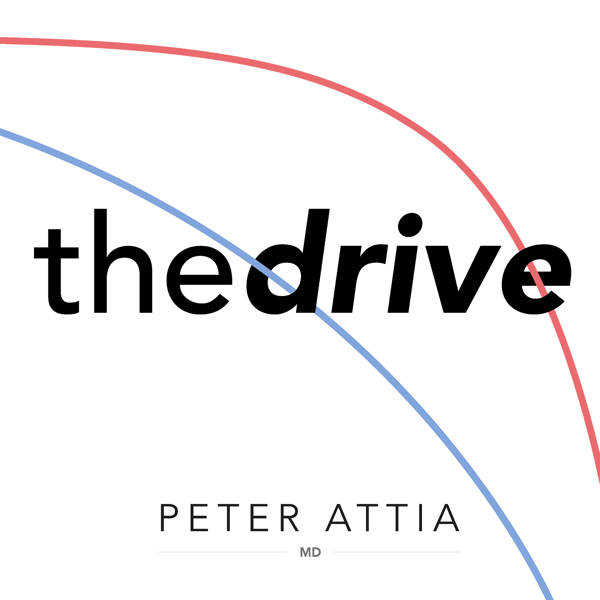#216 - Metabolomics, NAD+, and cancer metabolism | Josh Rabinowitz, M.D., Ph.D.
The Peter Attia Drive
Peter Attia, MD
4.7 • 7.3K Ratings
🗓️ 1 August 2022
⏱️ 132 minutes
🧾️ Download transcript
Summary
View the Show Notes Page for This Episode
Become a Member to Receive Exclusive Content
Sign Up to Receive Peter’s Weekly Newsletter
Josh Rabinowitz is a Professor of Chemistry and Integrative Genomics at Princeton University, where his research focuses on developing a quantitative, comprehensive understanding of cellular metabolism through the study of metabolites and their fluxes. In this episode, Josh focuses the discussion on three main topics: metabolomics, NAD (and its precursors), and cancer metabolism. The metabolomics discussion starts with a broad definition of metabolism, metabolites, and fluxomics before diving deep into glucose metabolism, lactate as a fuel, movement of lactate, and the regulation of these substrates. He then gives a detailed explanation of the electron transport chain and Krebs cycle and their implications with respect to both drugs and nutrition while also explaining how NAD is central to the process of energy generation. He then discusses the age-related decline in NAD and what current literature says about efforts to increase NAD through intravenous or oral supplementation with the precursors NMN and NR, including whether doing so provides any advantage to lifespan or healthspan. Finally, Josh ends the conversation talking about cancer metabolism and how one particular intersection between cancer metabolism and immunotherapy might provide a hopeful outlook on the future of cancer treatment.
We discuss:
- Josh’s background and unique path to becoming a research scientist at Princeton [3:30];
- What sparked Josh’s early interest in metabolism [11:15];
- Metabolomics 101: defining metabolites and how they are regulated [16:30];
- Fluxomics: metabolism as a system in action [26:00];
- The Randle Hypothesis: glucose and fatty acids compete as substrates for oxidation [33:30];
- The important role of lactate as an alternate fuel [36:30];
- Fasting lactate levels as a potential early indicator of metabolic dysfunction [48:00];
- The beauty of the Krebs cycle and the role of NAD in energy production [53:15];
- How the drug metformin acts on complex I of the electron transport chain [1:05:00];
- The difference between NADH and NADPH [1:08:45];
- NAD levels with age, and the efficacy of supplementing with intravenous NAD [1:10:45];
- The usefulness of restoring NAD levels and efficacy of oral supplementation with NAD precursors NR and NMN [1:22:15];
- Exploring the hypothesis that boosting NAD levels is beneficial [1:32:30];
- Cancer metabolism and the intersection with immunotherapy [1:39:00];
- Making cancer a chronic disease: exploiting the metabolic quirks of cancer, augmenting the immune system, and more [1:46:15];
- The challenge of treating pancreatic cancer [1:50:30];
- Epithelial cancers that might respond to metabolic approaches to therapy [1:56:30];
- Josh’s hopeful outlook on the future of cancer treatment [1:59:00];
- Nutritional approaches to cancer attenuation [2:00:15];
- What makes Princeton University special [2:06:15];
- More.
Connect With Peter on Twitter, Instagram, Facebook and YouTube
Transcript
Click on a timestamp to play from that location
| 0:00.0 | Hey everyone, welcome to the Drive Podcast. |
| 0:13.0 | I'm your host, Peter Atia. |
| 0:14.8 | This podcast, my website, and my weekly newsletter, all focus on the goal of translating |
| 0:18.7 | the science of longevity into something accessible for everyone. |
| 0:22.4 | Our goal is to provide the best content in health and wellness, full stop, and we've |
| 0:26.6 | assembled a great team of analysts to make this happen. |
| 0:29.4 | If you enjoy this podcast, we've created a membership program that brings you far more |
| 0:33.2 | in depth content if you want to take your knowledge of this space to the next level. |
| 0:37.3 | At the end of this episode, I'll explain what those benefits are, or if you want to learn |
| 0:41.0 | more now, head over to peteratiamd.com forward slash subscribe. |
| 0:46.3 | Now without further delay, here's today's episode. |
| 0:49.0 | I guess this week is Josh Rebeneritz. |
| 0:53.2 | Josh is a professor of chemistry and integrative genomics at Princeton University, where his |
| 0:57.4 | research focuses on a quantitative comprehensive understanding of cellular metabolism through |
| 1:01.6 | the study of metabolites and their fluxes. |
| 1:04.5 | He's also the director of the Princeton Branch of the Ludwig Institute for Cancer Research |
| 1:08.9 | and a member of the Rutgers Cancer Institute. |
| 1:12.0 | Josh earned his MD and PhD in biophysics from Stanford, which is how we met. |
| 1:16.5 | We were in the same graduating class, although he, of course, started earlier because he |
| 1:20.3 | did two degrees. |
| 1:21.8 | In between earning his MD and PhD and joining the faculty at Princeton, Josh worked at Alexa |
| 1:26.7 | Pharmaceuticals as the co-founder and vice president of research, a topic that we actually |
... |
Please login to see the full transcript.
Disclaimer: The podcast and artwork embedded on this page are from Peter Attia, MD, and are the property of its owner and not affiliated with or endorsed by Tapesearch.
Generated transcripts are the property of Peter Attia, MD and are distributed freely under the Fair Use doctrine. Transcripts generated by Tapesearch are not guaranteed to be accurate.
Copyright © Tapesearch 2025.

